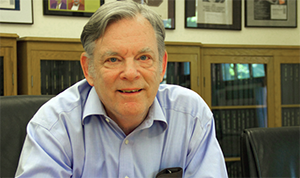Understanding the Chemical Industry with Professor Jeff Siirola
“What do you think is the oldest manufactured product?” asks ChemE/EPP Professor Jeff Siirola as he leans back in his chair. With a smile, he pauses and continues, “Beer. Early Egyptians discovered that starch turned into sugar when their barley accidentally got wet. Yeast was in the air and turned the sugar into ethanol. This process was a huge advancement for water purification, because bacteria can’t survive in ethanol.”

After just an hour of conversation with Siirola, Distinguished Service Professor of Sustainable Energy Systems, it’s clear why students speak so highly of his Industrial Chemical Technology course—they learn so much. Lightheartedly called “Siirola Storyhour” by the professor himself, the course covers the past and present of process engineering and is sprinkled with a multitude of interesting engineering anecdotes. Such as, do you know the engineering origin of the term “limelight?” (Before electricity was invented, calcium oxide, commonly known as quicklime, was used in stage lighting because it produces a very bright light when heated.)
The course is offered jointly through the Department of Chemical Engineering and the Department of Engineering and Public Policy and is open to both graduate students and undergraduate upperclassmen. The audience for the class is diverse, including younger students preparing to step out into the workforce, and students with years of work experience. A quick scan of the syllabus will bring you through dozens of topics, including historical technology developments, inorganic and organic processes, fuels, and sustainability. The list of processes that the class studies spans from dairy products, to petroleum refining, to plastics production.
Most of an engineer’s courseload includes applied mathematics and science courses, so Industrial Chemical Technology is one of the most unique engineering courses offered at Carnegie Mellon. “The goal is for students to see the big picture of how the skills they learn throughout their courses fit into the real industrial jobs,” says Siirola. “In an industrial career, it’s important to have a sense of your place in history: what has happened before you and what are the challenges that lay ahead of you in your field?”
Siirola began his career in academia after almost 40 years in chemical manufacturing. When he joined the faculty at Carnegie Mellon, he was inspired to create this course based on a popular descriptive course in the field during the 1940s and 1950s, called "Chemical Process Industries."
“Chemical engineering is traditionally taught so that students learn sub-processing steps, no matter what they are processing,” explains Siirola. “Descriptive chemical engineering instead goes into the background of each process and explores the depth of our industry. It attempts to answer a lot of questions you’ll encounter: How big is big in a process? How small is small? What’s the history behind these processes? How have available raw materials, environmental concerns, and processing technologies evolved over time?”
Industrial Chemical Technology ends with discussions on energy and sustainability, topics that live at the intersection between chemical engineering and policy and are huge challenges in both fields. “We started talking about modern-day topics such as shale gas discovery, carbon dioxide in the atmosphere—these things that are in the news, are very current, and that I am going to be interested in working on in the next 10-15 years,” says Bobby Balsom, a ChemE master’s student who currently works as a senior process engineer for a plastics company. “To hear Dr. Siirola speak about what is coming next—what the next challenges are, how the field is going to evolve—that hit home for me. I got a better appreciation for what is going to be impactful. It’s very interesting, because sometimes you get buried in your own little world.”
Industrial Chemical Technology has been offered each fall semester since 2012. Since its creation, Siirola has had colleagues from other universities model similar classes from the syllabus. “This class is an opportunity to share tidbits about our industry as it has evolved over the years,” he says. “I hope certain aspects will rub off on students in a way that they will remember ‘there was something weird about…’ and understand what the industry is like.”
Without a doubt, his strategy seems to be working.